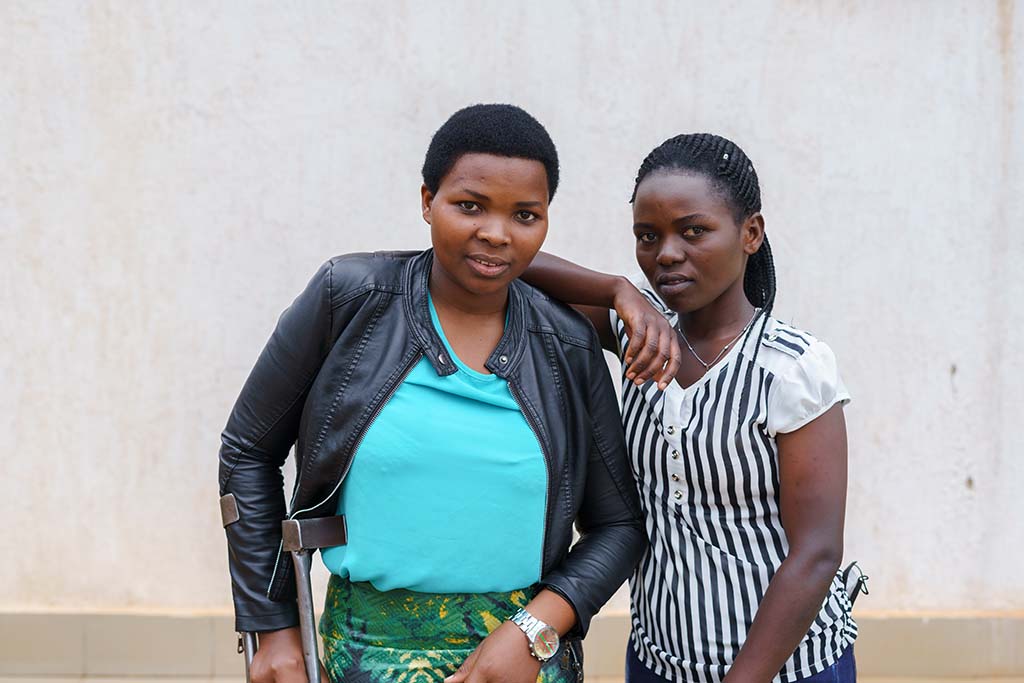Sharing ideas about a better future: the impact of youth dialogue in Rwanda
Fostering dialogue and providing education on sexual and reproductive health and rights—that is what Haguruka, one of The Kvinna till Kvinna Foundation’s partner organisations in Rwanda, set out to achieve by organising dialogue sessions for young adults. Participants Nadine and Ruth share their experience with the programme.

We meet with Nadine and Ruth at a youth dialogue session with Haguruka, The Kvinna till Kvinna Foundation’s partner organisations in Gasabo district, Rwanda.The two are amongst the participants in the organisation’s programme designed to educate youths about sexual and reproductive health and rights.
The aim of the program is to provide a safe space for young individuals, as well as a space for critical thinking. The sessions involve discussing issues such as women’s rights and sexual and reproductive health and rights, aiming to ensure long lasting change in Rwanda.
“The program has helped me and other young people in the area gain knowledge on things we didn’t know before. For example, if I was in a relationship, me and my boyfriend would know what we have the right to do,” says 24-year-old Nadine.
Knowing where to turn for support
Moreover, the sessions offered by Haguruka have provided participants with valuable information on where to turn to for support.
“The sessions have helped me to know what to do when I experience a problem, for example, an [unwanted] pregnancy. I now know that if I or someone I meet faces this challenge, the best advice is always to turn to the nearest health centre,” says 21-year-old Ruth.
“They have also helped me to be able to prevent unwanted sex. And I [now] know that in the case of rape, I have the right to abortion.”
Different types of violence against women and girls
Apart from educating participants on sexual and reproductive health and rights, the sessions also focus on violence against women and girls. Amongst other forms of gender-based violence, the sessions aim to shed light on subtle forms of aggression that are often overlooked or not recognised as violence.
“One example is when a man comes and shows you that he has money. Then they feel like they can do whatever they want because there is something you can get from them, and you agree to things you don’t want to do,” says Nadine.
Offering job advancements or improved living conditions in exchange for sex is one of the examples of violence girls face. When it comes to violence against women, the participants are also educated on domestic and economic violence.
“Sometimes a man might feel like all the properties belongs to him alone and his wife won’t have control over the family assets. He can also try to force his wife to have sex and if she gets pregnant, the man leaves because he doesn’t want to take care of the children,” says Nadine.
Fostering dialogue between the sexes
The sessions are run by trained community facilitators in collaboration with Haguruka’s staff. They work with mixed groups of both girls and boys, as they believe that it is important to encourage a conversation between the sexes—an idea that both Nadine and Ruth align with.
“It’s important because, in the past, parents used to think that only boys have the right to an education and school. Having both boys and girls [in these sessions] helps us be freer and share ideas to have a better future together,” says Nadine.
“It’s a good approach because both boys and girls can speak freely,” says Ruth.
A brighter future
The programme Nadine and Ruth have participated in has contributed to a brighter future both for them and their community, they say.
“It has helped us to share the knowledge with other young people that are not part of the programme,” says Nadine.
“In the future, I would like to become a trainer for Haguruka myself,” says Ruth. “I feel like it is something I could do well.”
Kvinna till Kvinna has supported women’s rights in Rwanda since 2017. One of our partner organisations is Haguruka. Haguruka focuses on ending violence and provide a youth programme for both men and women to learn about SRHR. Read more about our work in Rwanda »